‘Better Call Saul’ Postmortem: Peter Gould and Michael McKean Talk Chuck’s Hope, Slippin’ Jimmy, and Mike’s Dead Body Find
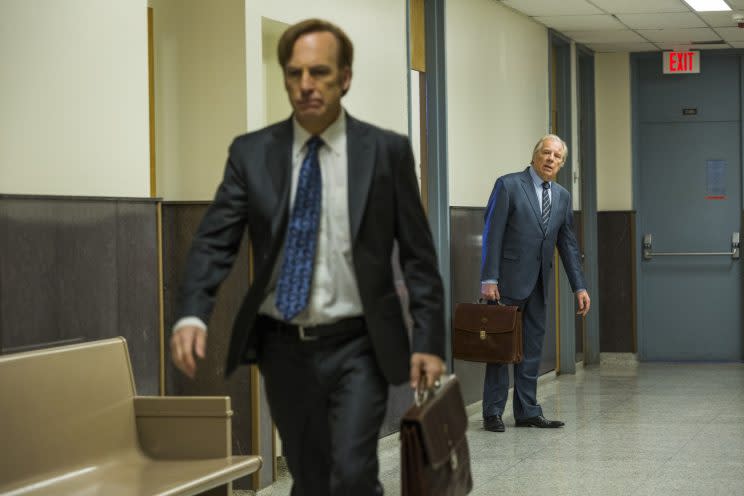
Warning: Spoilers ahead for the “Slip” episode of Better Call Saul.
The Band-Aid tin, the return of Marco, Slippin’ Jimmy scammin’, that body Mike found in the desert, Kim and Howard’s continuing entanglement in the McGill war, the official commencement of a Fring/Ehrmantraut partnership, and the most vulnerable, hopeful, and devastating Chuck scene of the series so far… yet another chockfull Season 3 episode of Better Call Saul sent Yahoo TV to series showrunner Peter Gould and star Michael McKean for scoop, and they didn’t disappoint.
From the origin of Omaha Gene’s Band-Aid tin and how the McGill brothers can see the same family affair so differently to the identity of the body Mike found in the desert (we were surprised!) and McKean’s thoughts on that very complicated Chuck/Howard partnership, the Saul fellas share their insights on what continues to be the show’s best season yet (and one of the very best shows on television).
I’ve been asking you what’s in Gene’s Band-Aid tin, from the series premiere, for three seasons… is Jimmy’s Band-Aid tin from Cicero, from his parents’ store, in the flashback of “Slip” the Band-Aid tin Gene has in the future?
Peter Gould: This is the Band-Aid box, and I’ll say this — and I may be saying too much — but this Band-Aid box probably appears again this season. If you keep your eyes peeled, then maybe the Band-Aid box shows up yet again in the teaser of [the season finale]. It is the box. Obviously, it’s very meaningful to him.
Does it have the same contents with Gene in Omaha?
Gould: I don’t think so. I think because you see Jimmy empty out the box…it had the old coin collection. It isn’t in there anymore most likely. Maybe it is, maybe it is. But I think there might be something else in there by the time Jimmy becomes Gene and escapes to Omaha.
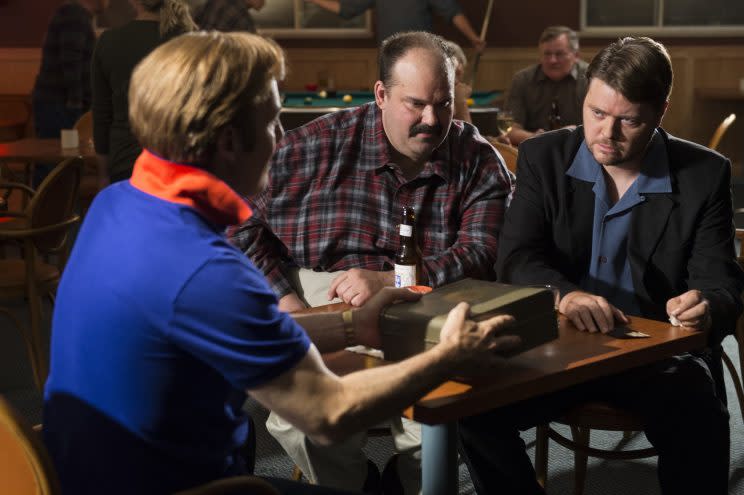
That opening, by the way, showed us more of Saul slipping out. It felt like a gut punch because even Marco (Mel Rodriguez) is noting in that scene, he’s disappointed in Jimmy, because Jimmy is showing such little respect for his parents and their efforts to run a business.
Gould: People mourn in all kinds of different ways. I think Marco really does love Jimmy, but Jimmy’s got a lot of anger, and it’s interesting, because… that scene in Season 2 [in “Rebecca”], where Chuck gave Kim his version of why their father lost the store… here’s Jimmy’s version, which is not that, “I stole from the till and drove the store into bankruptcy,” it’s that, “my father wasn’t willing to do the things he needed to do to keep the store open.” We’ve heard two different versions; maybe they’re both right. They could be potentially.
Michael McKean: It’s also two different views of morality, this. Two very different people. Sometimes two people start out at the same place and wind up with different moralities specifically because they are different. “I’m not going to be like him, because I’m me, and I’m not him.”
We’ve all been looking at this as, “When is Jimmy going to become Saul?” Is that the wrong question? It seems like we’re learning more and more that Jimmy’s always been Saul in a way. He does have this anger in him, this bitterness, and maybe we didn’t see it, because, as Chuck has said, everybody loves Jimmy. We’ve focused on the good, fun, charming things in him. But now we’re starting to see, in that flashback scene for instance, that he’s had this anger, this bitterness about his parents’ failure — what he sees as their failures — with their business. Have we been asking the wrong question? He isn’t really becoming Saul, he’s just revealing, has revealed, more of these less endearing aspects of himself?
Gould: This is going beyond drama into the question of do people change? People seem to change, but are they really changing or are they revealing new aspects that were always there? Those are things, man, we talk about them all the time in the writer’s room, and in life we talk about them all the time. “How could this person do that?” Well, I understand how you draw a line from this to that. We tend to put them in psychological terms, maybe they’re philosophical, too. We certainly say Saul Goodman’s an identity that a man takes on for reasons, and hopefully as we go, those reasons will come about and some of them are going to be purely logical and some of them are going to be emotional. Interestingly enough, sometimes it’s easier for me to see the emotional reasons that people do things, but the truth is, in real life, most people will give you a functional reason for all their decisions. Sometimes the functional reason, which, arguably, the self-deception, is harder to understand than the emotional reason. Boy, that’s heavy. Maybe that’s almost too abstract.
McKean: I’m a little worried because you made total sense. Usually by this time, I’m a little lost. No, that was very well said.
Peter, I think the scene from “Slip” you were maybe referencing during the Facebook Live as one of the best Chuck scenes of the series so far is devastating, when he’s talking to Dr. Cruz, and he tells her about his illness, “If it’s not real, what have I done?”
McKean: Imagine Chuck thinking it, and actually saying it out loud. That’s the only person he’s honest with, really; the only person we’ve seen have an honest conversation with him about himself. It also helps to have Clea Duvall there on the set. She’s a remarkable actress and wide open, she’s terrific.
Gould: This is a beautiful script, I just want to say, by Heather Marion, who was our writer assistant Seasons 1 and 2, and wrote half of the finale in Season 2. This was her first solo episode of television, and she did a great job.
And it’s another great Season 3 episode where six or seven major things are going on. And in Chuck’s conversation with Dr. Cruz, we see him more vulnerable than we’ve ever seen him, certainly, and we had seen him probably lighter and more optimistic than we’ve ever seen him earlier in the scene. Is it tough to switch between those two extremes so seamlessly in the same scene?
McKean: Yeah, but it’s concurrent, too. While he’s saying, “I’m going to have parties, I’m going to have people spilling out onto the lawn,” he knows that eventually — because that’s what she’s here for — he’s going to have to tell her about what happened and what that might mean, and then he ends with a question that she can’t answer for him, but at least he’s saying it out loud. He can say, “What have I done?” It’s a rhetorical question, but it’s one he needed to say out loud to another human being. It may be something that he’s already said to the ceiling, but this is a person with ears, and that’s different.
Gould: I think in that scene. Dr. Cruz is good at what she does. She’s really letting him do all the work, which is I think what, hopefully, a good therapist would do, a good psychologist would do.
McKean: A good psychologist wouldn’t say “Good, then you’re cured, and I’m out of here.” They know better than that. Clearly, he’s saying, we’re not done here. They’re both agreeing that they’re not done, but the thing is, “What have I done?” is about the rest of the world. Everything else he’s said in this scene is about what’s going on here. [That] is about the trail he left behind. She can’t really help him with that, but she can maybe help him live with it.
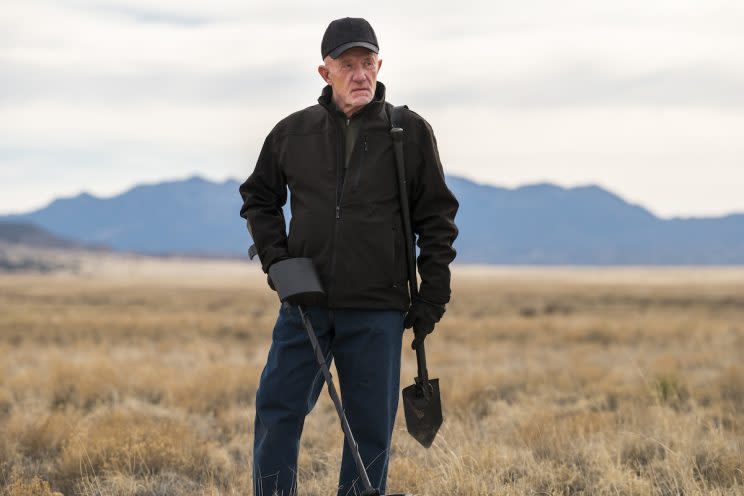
There is also a wonderful opening scene with Mike, who has had very little dialogue in several of his most powerful scenes this season, but manages to tell us everything we need to know, of course, because Jonathan Banks is so great. Why did he specifically go to find Anita’s husband? Was it to give her closure because he’s interested in her?
Gould: Just to be clear, that’s not Anita’s husband.
Oh!
Gould: Remember, she said her husband vanished years ago… in [“Expenses”], she says her husband vanished years ago… she’s essentially saying she’s lost this person, and she wants closure because she doesn’t know what happened to the body. Mike is so dripping with guilt at all times, ever since we’ve met him, about his son, about so many things. About the things he did to avenge his son. If Chuck is starting to get to grips a little bit with the damage he’s done in his life, Mike is weighed down by [his damage] and is driven by it almost completely. Mike hears this from this woman, and he thinks to himself about the good Samaritan who died, really, because Mike had this clever idea that he thought would be zero impact, about raiding Hector’s truck. He goes out to make sure that body is found, and that’s what we intended. I know the bread crumbs are scattered, I understand that, but it’s not intended to be Anita’s husband… she says he was lost in a forest, and it was years ago. Mike’s not coincidentally meeting the wife of the victim, Hector’s victim. We never know what happened. We had talked about having Anita’s husband be MIA, in the military. We had talked about a lot of possibilities before we landed on the idea of the story as it’s told in that episode.
The husband, the missing husband, is he one of those situations where maybe we don’t need to know the rest of the story?
Gould: You know, all I can say is Tamara Tunie is wonderful, and this character has unfinished business.
“Slippin’ Jimmy” is literal with that nickname in this episode, at the music store, and then still slippin’, but not so literally, with his scam of the community service supervisor, on behalf of the drug dealer. His antics are always entertaining, but especially the incident with the community service guy, it does bring to mind Chuck’s devastating line comparing Jimmy with a law degree to a chimp with a machine gun. Jimmy’s wickedly savvy, but he’s also capable of using what he’s got to damage people who are pretty innocent in the scheme of things. And unlike Mike and his good Samaritan, Jimmy doesn’t feel too bad about it.
Gould: You know, Jimmy is somebody who’s really good at talking and working the angles. That can be something that is used for good or for bad. I think in this case, Jimmy would say, up to a point, he’d say the ends justify the means. Certainly with the Sklar brothers at the music store. “Those guys are trying to rip me off, we had a handshake agreement, and now they’re talking about cutting me out for really no good reason except they don’t want to pay me, so I’m going to go back and do a slip-and-fall.” That would be his justification. I don’t know what his justification would be for getting that young drug dealer to a meet, getting him away… I don’t think there is a justification for that, except for, “I want money, and I’m angry.”
McKean: He’s taking down this… the straw boss. They’re always a pleasure.
Gould: That’s true, that’s true. He’s sticking it to “The Man.” You’re absolutely right. There are all kinds of emotional reasons, but if he looks at his own morality, he might not see it that way. At the end of the episode, the last thing we see of Jimmy, he’s lying back on the ground, he’s got a bunch of money, he’s looking up at the sky. I don’t think he’s looking very guilty at that point. You can call that Saul-ish, certainly.

The Kim-Howard showdown… they have plenty of reasons to be angry, specifically with each other, but are they also angry at being pulled into the McGill brothers’ war? Is it inevitable that they realize that and commiserate and become partners — or maybe that’s too strong of a word, but allies — in not allowing themselves to be in the middle of that, and the fallout of that?
Gould: That’s an interesting thought. There’s certainly bad blood between Kim and Howard. Arguably, they’re both struggling with the results of Chuck, with things that Chuck has done, and Howard has been Chuck’s loyal friend, ally, puppet, ever since we first met him. This is the first time that I get the sense that he’s not too happy with the way things are going.
McKean: But there were glimmers of that before, when Howard let Kim in on, in Season 1, when he…
Gould: That’s right. He told Kim, “I’m not the bad guy here, really.”
McKean: If he were a complete loyalist, he probably wouldn’t have done that.
Gould: That’s true, and also, the way Patrick [Fabian] plays this character, he’s so layered. Patrick is wonderful this season, he is great.
McKean: The scene with Kim [in “Slip”] was awfully good, I thought, and, boy, [Michael] Mando’s stuff, that silent stuff with the [pills], was so good.
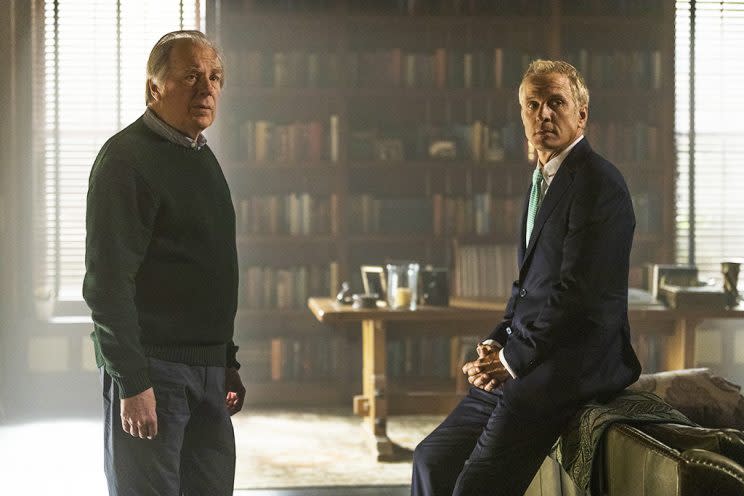
In terms of Howard and Chuck, there is so much we still don’t know about their partnership, and how it’s divided up. Who really is the senior partner? What happened to the other “H” in HHM?
McKean: Right, well we always assume that old man Hamlin is gone, either retired or dead, and that I, being quite a bit older… the surrogate father. That’s examining too closely, but that’s a shadowy area, really. That’s very much what their relationship is, and it’s iffy, you know? I’ve personally been approached to mentor people, young actors. I’ve been very nice about it, but I’ve basically put it this way: If what you find in yourself is an emptiness that needs to be filled by another person, that’s not the time to look for someone to help you. You have to almost be on the same… it’s sort of like, mentors happen accidentally. Your father is my law partner, and now I can help you, and I become something of a mentor, and that’s how it happens. If you’re seeking something outside your own circle, then maybe you need to do a little bit more work first.
Also, the way I put it, just to get rid of them fast, is, “Oh, you don’t want me!” You know, if you want to come over to my house, we’ll smoke a joint and watch TCM, that’s one thing.
In the final shot, we see the official beginning of the Mike/Gus partnership, which we know is going to be very fruitful because Mike ends up with a lot more than $200,000. How quickly does that really start running?
Gould: Mike is trying to put limits on it, isn’t he? He wants it to be a very functional relationship, that’s his idea.
McKean: You know what I noticed? I’ve seen up to Episode 3, and then nothing, and then Episode 8 [from this season]… There was something that struck me: Giancarlo [Esposito], he’s a hero, but the handshake that [Gus] offers is so anal, it’s this [mimics a gentle handshake]. There’s something small about it, you know? That’s a handshake that Mike will take, like, “I’ll meet you this far.” There’s nothing “Bang!” about it, it’s, “What do you think?” It’s kind of lovely.
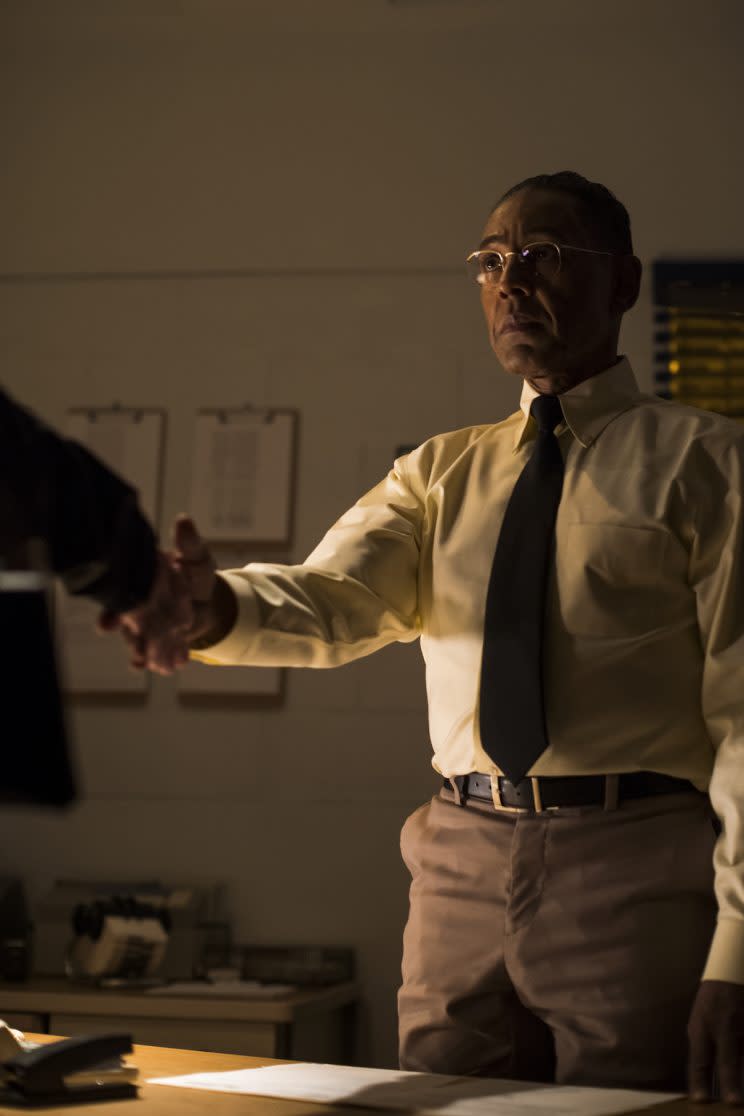
Gould: You’re so right, and Giancarlo, he makes every gesture so formal and considered. The two of them… of course, they’re such interesting characters to write when they have scenes together, Gus and Mike, because they’re both men of few words. Mike, it seems like every word is costing him $50, and he’s on a fixed income. Gus is measuring everything so carefully, it’s a little bit like writing haiku. We often find ourselves crossing things out and trying to simplify and trying to boil it down to the very minimum that we can do, because especially those two actors, they put so much in between the words. It’s fun to have them in an episode with characters like Jimmy and Chuck, who are both loquacious as hell. They both speak beautifully, and they speak a lot, so going to Mike and Gus is a really fun contrast for us.
They almost seem inevitable that they became partners, those two characters.
Gould: That’s interesting… it could be inevitable, or it could be Gus’s doing to some extent. I think Gus has a wonderful sense of, he says it on Breaking Bad, he said, “I like to think I see things in people.” He’s a great judge of character and ability, and he has seen that Mike has proven himself to be spectacularly capable. At the beginning of the season, Mike turns Gus’s surveillance inside out in a brilliantly simple way that took us weeks to figure out in the writer’s room.
McKean: Oh my God, trying to read that, because I’m not even involved in that stuff, but I’m reading these blocks of text thinking, “What the hell is Mike doing?” By the time we did it, I’d shot all my stuff, and then by the time I see it, I’m back to going, “What the hell is happening?” It just worked perfectly.
Gould: That’s wonderful to hear. Gus, I think, would really like Mike as a helper. Mike, on the other hand, I don’t think Mike… It’s easy to see the difference between Jimmy McGill and Saul Goodman. Saul Goodman wears different clothes, he talks differently, he does different things. Mike’s journey is a moral one. He may dress the same way, he may speak the same way, but on Breaking Bad, he is shooting people and killing them on Gus’s orders. I can’t see Mike, even as here we are Episode 308… I think Mike is still quite a ways from doing things like that.
Better Call Saul airs Mondays at 10 p.m. on AMC.
Read more from Yahoo TV:

